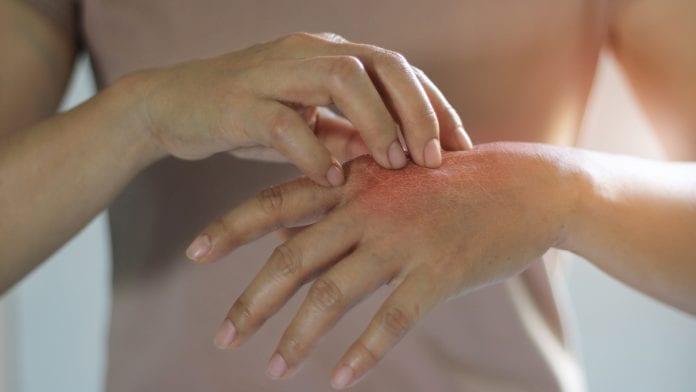
According to studies, increased depression, suicidal thoughts and stress are reported in patients with chronically itchy skin.
Reported in the Journal of Investigative Dermatology, published by Elsevier, a new multicentre European study assessed the burden of chronically itchy skin on dermatological patients’ psychological wellbeing.
Scratching the surface of the condition
Itch is a common symptom in patients suffering from skin diseases. In a new multicentre cross-sectional study on the psychological burden of itch, investigators report that the presence of itch in dermatological patients was significantly associated with clinical depression, suicidal thoughts and stress.
The researchers recommend providing patients with access to a multidisciplinary team to prevent and manage problems associated with itch.
The burden of itch has already been described in conjunction with a number of specific skin diseases including hand eczema; psoriasis; nodular prurigo (a skin disease that causes hard, itchy lumps to form on the skin); hidradenitis suppurativa (a painful, long-term skin condition that causes abscesses and scarring on the skin) among haemodialysis patients; and in chronic itch patients in general.
“There are already studies showing evidence of a correlation between itch and mental health problems in general, and in specific skin disorders, but there is a lack of a cross-sectional study across chronic skin diseases,” explained lead investigator Florence J. Dalgard, Department of Dermatology and Venereology, Skåne University Hospital, Lund University, Sweden.
Details of the study
Part of a large European multicentre study conducted by the European Society for Dermatology and Psychiatry (ESDaP), the present study compared the psychological burden of disease and health-related quality of life between dermatological patients with itch and those without itch, as well as with healthy controls.
Investigators collected data from dermatological clinics in 13 European countries on 3,530 patients with skin diseases and compared the results with more than 1,000 healthy controls. Patients completed questionnaires and were also examined clinically.
Outcome measures included the presence, chronicity and intensity of itch; the Hospital Anxiety and Depression Scale, sociodemographic, suicidal ideation, and stress, including negative life events, and economic difficulties.
The prevalence of itch in dermatological conditions was nearly 90% in prurigo and related conditions; 86% in atopic dermatitis; 82% in hand eczema; 78% in other eczema; 76% in urticarial; and 70% in psoriasis.
What did the results show?
The prevalence of depression was 14% in patients with itch compared to 5.7% in patients without itch, 6% in controls with itch, and 3% in controls without itch. The prevalence of suicidal thoughts was 15.7% in patients with itch, 9% in patients without itch, 18.6% in controls with itch and 8.6% in controls without itch.
The reported occurrence of stressful life events was higher in individuals with itch than in those without itch. Patients with itch were also likely to experience more economic problems.
“Our research shows that itch has a high impact on quality of life,” commented Dalgard.
“This study illustrates the burden of the symptom of itch and its multidimensional aspect. The management of patients with itch should involve access to a multidisciplinary team when necessary, as is already the case in several European countries.”
Preventive measures
The investigators also recommend preventive measures, such as psoriasis education programs or targeted web-based information.
In many chronic inflammatory skin disorders, early aggressive treatment tailored specifically for the patient might help to reduce itch at the earliest possible opportunity and prevent the development of mental health problems.
Existing anti-itch interventions should be implemented more frequently in the routine care of dermatological patients.






















